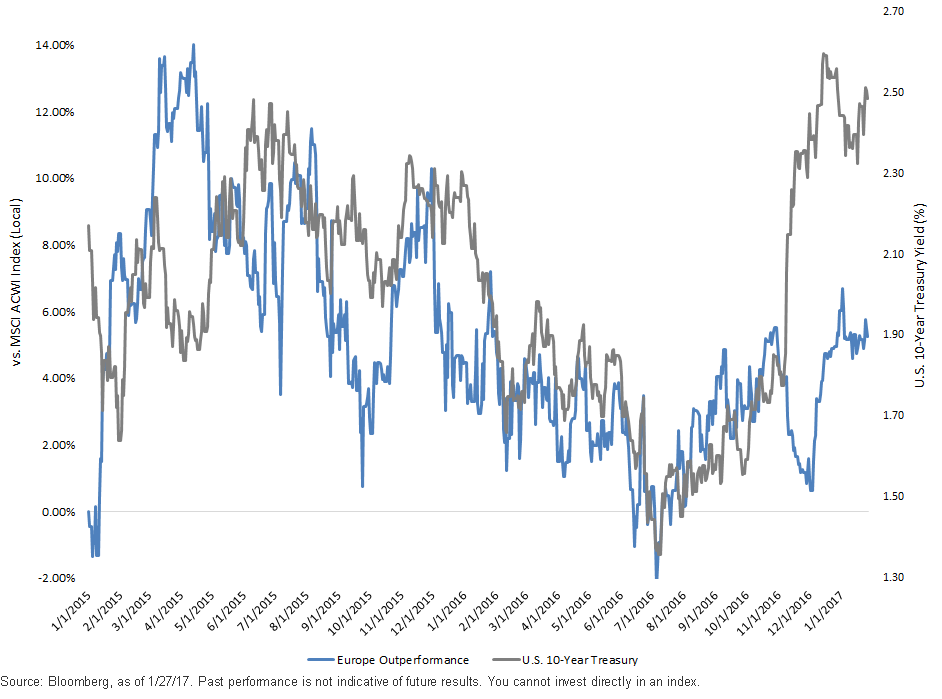U.S. Rates May Signal Opportunity in Europe


In an earlier discussion this year, we noted that the value of the U.S. dollar would likely be among the most important determinants of asset class returns in 2017. In a similar vein, many market participants are also looking to what happens to U.S. interest rates for clues about what may be occurring in the global economy. In our view, a recent disconnect in the market may be signaling that European equities could provide an opportunity for global investors.
We’re All Rates Traders Now
In the chart below, we compare the relative performance of the WisdomTree Europe Hedged Equity Index (WTEHIP) against the MSCI All Country World Index in local currency terms.1 On the right axis, we plot the yield of the 10-Year U.S. Treasury note. As you can see, rising U.S. interest rates have tended to generate excess returns for Europe relative to the rest of the world. However, after the election in the U.S., this relationship has broken down when Europe failed to rally despite a backup in U.S. rates. In our view, we believe this relationship is likely to reassert itself in the coming months, leading to gains for European stocks.
WTEHIP Index Excess Performance & U.S. 10-Year Treasury Yield 12/31/14–1/26/16

What’s Driving the Relationship
Over the last quarter, we’ve started to see a meaningful rebound in economic data from the eurozone in the form of increasing PMIs and a modest uptick in euro area capital spending. While no one is ready to claim that Europe’s troubles have been resolved, the early signs in the data are encouraging. In response, we’ve also seen a meaningful rebound in cyclical sectors like Industrials and businesses linked to the consumer. Given WisdomTree’s export-oriented methodology, the strategy currently is over-weight in all of these sectors.2 As expectations for global growth continue to rise, we believe many of these large multinational firms could be poised to benefit. However, the primary breakdown in the relationship of higher rates and growth seems to be driven by a fear about upcoming elections across Europe.
The Rise of Populism
For many investors, a key risk for Europe in 2017 is the upcoming elections in the Netherlands (March 15) and France (April 23). Should populist candidates win these contests, could this begin the slow unraveling of the euro area? After a year of political surprises, markets could be failing to rally because of these concerns. However, in our view, the rise of anti-globalist populism remains extremely unlikely for several reasons. In the Netherlands, while Geert Wilders’ Freedom Party (PVV) continues to lead in the polls, it is unlikely that it will be able to form a government absent a significant number of coalition partners. In our view, this effectively caps the power of his party’s likely slim majority to make radical changes in the Netherlands relationship with the EU. While the U.S. is currently grappling with the translation of campaign rhetoric to policy, anti-immigration sentiment from the PVV and its voters is unlikely to derail the European recovery in a meaningful way.
In France, Marine Le Pen of the National Front Party (FN) is currently expected to make it to the second round3 of the presidential contest, to be held May 7. However, even if she were to win, her ability to trigger a vote on EU membership would remain extremely remote. For that to occur, the FN would need to also pick up a majority of seats in parliamentary elections on June 7. Today, the FN holds one seat out of 577 in France’s lower house. As a result, Le Pen will need to form a coalition government and select a prime minister from among her political rivals. This split between president and prime minister in France is referred to as “cohabitation.” Similar to a split between houses of Congress and the presidency in the U.S., we have seen how compromise currently functions in the modern political system. In this scenario, the ability for Le Pen to amend the French constitution to then trigger a referendum on EU membership appears remote at best. As president, Le Pen would still wield significant powers; however, the risk of international unilateral actions would be diminished.
In sum, we believe that Europe currently presents an opportunity for investors. While risks remain, we believe that the market may be overly pessimistic about the likelihood of political dysfunction. In our base case for 2017, we believe U.S. rates will continue to rise on the back of a rebound in global growth. Should the current relationship between Europe and U.S. rates hold, this could present an opportunity in the medium term for European equities.
1A similar chart was published by JPMorgan research in a note on 1/16/17.
2Source: WisdomTree, as of 1/27/17.
3No candidate has ever achieved 50% of the first ballot vote in the history of the French Republic.
Important Risks Related to this Article
Investments focused in Europe increase the impact of events and developments associated with the region, which can adversely affect performance.

